Daily Current Affairs and GK | 11 June 2020

Main Headlines:
- 1. For the first time in the country, the number of people recovering from COVID-19 infection is more than its patients
- 2. Annual allocation of Rs 4,000 crores to states under Per Drop, More Crop for the year 2020-21
- 3. Inauguration of Deep Submerged Rescue Vehicle, DSRV Complex, at Visakhapatnam
- 4. Bangladesh Government has launched an online network to facilitate plasma exchange for the treatment of COVID-19
- 5. Uttar Pradesh government directed to start the TrueNAT machine in all 75 districts by 15 June 2020
- 6. S&P retained India’s BBB- rating with a stable outlook
- 7. Increase in the number of Asiatic lions by about 29%
- 8. Ramon Magsaysay Award canceled this year due to coronavirus pandemic
- 9. Largest Biodiversity Park of Uttarakhand opened in Haldwani
- 10. Himachal Pradesh government’s attempt to boost Heeng and saffron yields
Happy February get 35% Off
Use Coupon code FEB26
1. For the first time in the country, the number of people recovering from COVID-19 infection is more than its patients
- For the first time in the country, the number of people recovering from COVID-19 pandemic has exceeded its patients.
- This is good news in the direction of controlling this disease.
- So far, 1,35,205 COVID-19 patients in the country have been cured, while the current number of infected is 1,33,632.
- These people are undergoing treatment.
- The recovery rate in the country has risen to 48.88 percent.
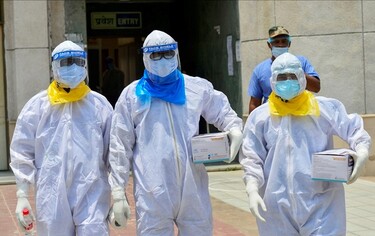
(Source: News on AIR)
2. Annual allocation of Rs 4,000 crores to states under Per Drop, More Crop for the year 2020-21
- An annual allocation of Rs 4,000 crore has been made to the states under the per drop, more crop component of the Pradhan Mantri Krishi Sinchayi Yojana for the year 2020-21.
- Recently, the Union Ministry of Agriculture has announced this.
- Also, the government has created a micro-irrigation fund of five thousand crore rupees with NABARD.
- The purpose of this fund is to facilitate the States in mobilizing resources for the expansion of micro-irrigation.
- The plan is to increase water use efficiency at the farm level through drip and sprinkler irrigation systems and other micro-irrigation technologies.
- Drip micro-irrigation technology not only helps in saving water but also helps in reducing fertilizer usage, labor expenses and other input costs.
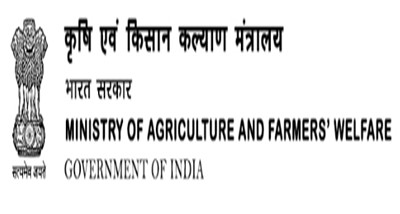
(Source: News on AIR)
3. Inauguration of Deep Submerged Rescue Vehicle, DSRV Complex, at Visakhapatnam
- Recently the DSRV complex, a deep submerged rescue vehicle, was inaugurated in Visakhapatnam.
- The DSRV complex is designed to accommodate the newly incorporated submarine rescue system.
- The DSRV system consists of a submarine rescue vessel, a remote operation vehicle, side scan sonar and related equipment.
- It is the dive chamber and hyperbaric medical equipment to dismantle the submarine after rescuing the submerged submarine.
- The DSRV system can be rapidly abandoned by air or road to facilitate submarine rescue operations, even at distant locations.
- The Indian Navy has incorporated two systems that will provide rescue cover to submarines on the west and east coast of India respectively.
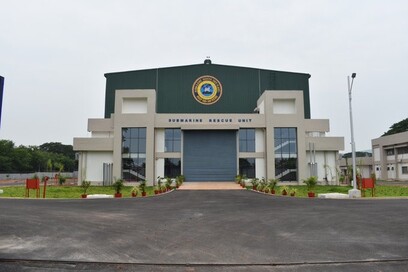
(Source: News on AIR)
4. Bangladesh Government has launched an online network to facilitate plasma exchange for the treatment of COVID-19
- Recently Bangladesh government has launched an online network to facilitate plasma exchange in the country for treatment of COVID-19.
- The name of this initiative is Sahyodha.
- The number of people infected with corona in Bangladesh has risen to 71,000, while it has killed 975 people so far.
- Convalescent Plasma Therapy:
- In this therapy, the recent convulsant sera of a person recovering from infection are injected into another patient of Covid-19, as the patient recovering from the disease will have antibodies that can help other patients get rid of the coronavirus.
- Bangladesh:
- It is located in the east of India on the Bay of Bengal.
- Its capital is Dhaka, and the currency is Bangladeshi Taka.
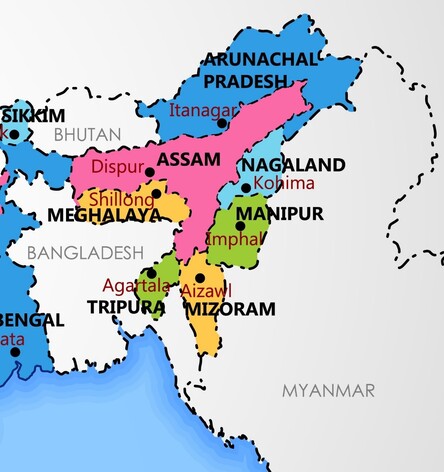
5. Uttar Pradesh government directed to start the TrueNAT machine in all 75 districts by 15 June 2020
- Recently Uttar Pradesh Chief Minister Yogi Adityanath has instructed to commission the TrueNAT machines in all 75 districts of the state by 15 June 2020.
- With the help of these machines, the number of COVID-19 tests can be increased.
- Recently ICMR approved the use of the TrueNAT machine for coronavirus screening tests.
- TrueNAT machines are used to test drug-resistant tuberculosis.
- Uttar Pradesh:
- It is the most populous state in India.
- The Chief Minister of the state is Yogi Adityanath and Governor Anandiben Patel.
- The capital of the state is Lucknow.
- The state animal of Uttar Pradesh is Swamp Deer, State Bird is Saras Crane, State Tree is Ashoka and State Flower is Brahma Kamal.
- Uttar Pradesh has 80 seats in the Lok Sabha and 403 assembly seats.
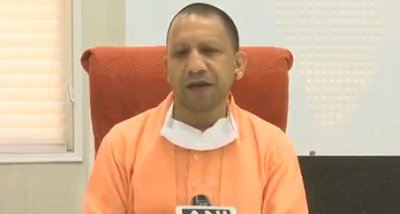
(Source: News on AIR)
6. S&P retained India’s BBB- rating with a stable outlook
- Recently S&P has retained India’s rating on BBB- with a stable outlook.
- According to S&P, risks to development are increasing, but India’s economy will soon stabilize after the control of the COVID-19 pandemic and the fiscal situation will begin to recover from 2021.
- The S&P also said that the stagnant outlook also assumes that the government’s fiscal deficit may decrease significantly after a multi-year high in fiscal year 2021.
- Fiscal deficit is the difference between the government’s total income and total expenditure.
- S&P Global Ratings is an American credit rating agency that was founded in 1860. It is headquartered in New York, United States.
7. Increase in the number of Asiatic lions by about 29%
- Recently population assessment exercise was done in the Gir forest area. It saw an increase of 29%.
- The number of lions has increased to 674 in the Gir forest region and other revenue regions of coastal Saurashtra.
- The last count was the lion population of 523 in 2015, which has increased to about 29%.
- The distribution of lions has increased from 22,000 sq km in 2015 to 30,000 sq km in 2020.
- According to forest department data, the male-female ratio in the forest area is 161 males per 260 females.
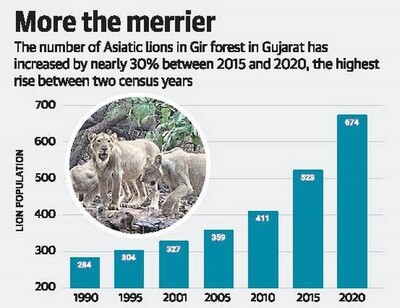
(Source: The Hindu)
8. Ramon Magsaysay Award canceled this year due to coronavirus pandemic
- Recently this year’s Ramon Magsaysay Award has been canceled due to the coronavirus pandemic.
- The award was also canceled due to the financial crisis in 1970 and the devastating earthquake in the Philippines in 1990.
- Ramon Magsaysay Award:
- It is the highest honor in Asia and is considered the equivalent of the Nobel Prize.
- The award is given annually to individuals or organizations in the Asia region for philanthropy and social service.
- It was established in 1957 in memory of Ramon Magsaysay, the third President of the Philippines.
9. Largest Biodiversity Park of Uttarakhand opened in Haldwani
- Recently, the state’s largest biodiversity park has been opened in Haldwani, Uttarakhand.
- Uttarakhand has inaugurated it on 5 June on the occasion of World Environment Day.
- Biodiversity parks are a natural storehouse of plant and animal varieties.
- The park has thematic gardens, an earthen museum, plant species, lichen, a vermicompost unit, and algae of moss and Jurassic age.
- An interpretation center and a state-of-the-art weather station have also been built.
- Uttarakhand:
- Uttarakhand was carved out of northern Uttar Pradesh on 9 November 2000 as the 27th state of India.
- The Chief Minister of Uttarakhand is Trivendra Singh Rawat and Governor Baby Rani Maurya.
10. Himachal Pradesh government’s attempt to boost Heeng and saffron yields
- The Government of Himachal Pradesh entered into an agreement with the Institute of Himalayan Bioresource Technology to boost the yield of asafetida/heeng and saffron.
- The Institute of Himalayan Bioresource Technology is the only laboratory of the Council of Scientific and Industrial Research in Himachal Pradesh.
- A state-of-the-art tissue culture lab will be established for mass production of quality planting material of both these crops.
- Under this scheme, new varieties of saffron and heeng from exporting countries will be standardized according to Indian conditions.
- Asafoetida:
- Asafoetida is a perennial plant, and it produces olio-gum resin from the roots after five years of planting. It can be grown on land with unusable slopes of cold desert area.
- Asafoetida is not produced in India and currently, around 1200 tonnes of raw asafoetida is being imported from Afghanistan, Iran and Uzbekistan.
- Saffron:
- In India, saffron is currently cultivated on approximately 2825 hectares of land in Jammu and Kashmir.
- Recently, Kashmir Saffron has got a Geographical Indication Tag.
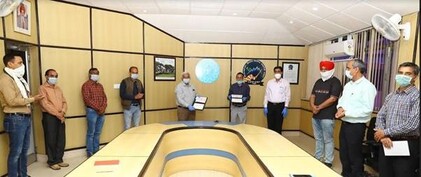
(Source: PIB)





 10 June 2020 Current Affairs
10 June 2020 Current Affairs 








Comments